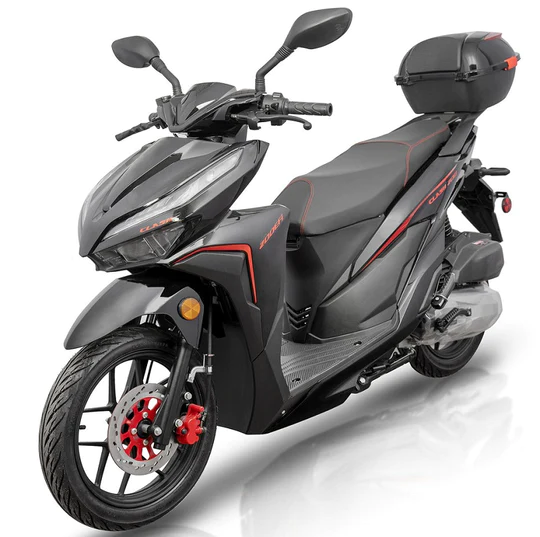How a moped scooter can benefit you
Table of contents
Moped scooters have gained popularity in recent years as a convenient and efficient mode of transportation. They offer several benefits to riders, making them a popular choice for commuting and recreational purposes. Here are some key advantages of using a moped scooter:

Fuel Efficiency: One of the primary benefits of using a moped scooter is its exceptional fuel efficiency. Mopeds are designed to be lightweight and have small engines, which consume significantly less fuel compared to cars or motorcycles. This makes them an economical choice for daily commuting, helping riders save money on fuel expenses.
Affordability: Moped scooters are generally more affordable than cars or motorcycles, both in terms of upfront cost and ongoing maintenance. The initial purchase price of a moped is typically lower than that of a car or motorcycle, making it a more accessible option for individuals on a budget. Additionally, the cost of insurance, registration, and maintenance for mopeds is generally lower, further reducing the overall expenses associated with owning one.
Ease of Use: Mopeds are relatively easy to operate, making them suitable for riders of all skill levels. They typically have automatic transmissions, eliminating the need for manual shifting and clutch control. This makes it easier for beginners to learn how to ride and navigate through traffic. Moreover, mopeds have a simple control layout with minimal features, making them less intimidating for new riders.
Maneuverability: Another advantage of using a moped scooter is its excellent maneuverability in congested urban areas. Their compact size allows riders to navigate through tight spaces and weave through traffic with ease. Mopeds can often bypass traffic jams by using bike lanes or taking shortcuts inaccessible to larger vehicles, saving time during daily commutes.
Parking Convenience: Finding parking in crowded cities can be a daunting task, but mopeds provide a solution to this problem. Due to their small size, mopeds can be parked in tight spaces or designated motorcycle parking areas, which are often more readily available and free of charge. This eliminates the hassle of searching for parking spots and can significantly reduce parking expenses.
Environmental Friendliness: Moped scooters are considered a greener alternative to cars and motorcycles due to their lower carbon emissions. With increasing concerns about air pollution and climate change, opting for a moped can contribute to reducing the environmental impact of transportation. Additionally, some mopeds are electric-powered, further reducing emissions and dependence on fossil fuels.
Health Benefits: Riding a moped scooter can provide some health benefits as well. Regularly using a moped for commuting or recreational purposes can help individuals incorporate physical activity into their daily routine. It requires balance and coordination, engaging various muscle groups, and promoting better overall fitness.
Fun and Enjoyment: Lastly, using a moped scooter can be a fun and enjoyable experience. The feeling of freedom and the wind in your face while cruising on a moped can bring joy and excitement to riders. It offers a unique way to explore your surroundings and enjoy the journey, whether it’s for commuting or leisurely rides.
FAQs
QUESTION:- What is a moped scooter?
A moped scooter is a small motorized vehicle that typically has two wheels, a low-powered engine, and pedals for propulsion. It is designed for short-distance travel and is often used as an alternative to cars or motorcycles in urban areas.
QUESTION:- What are the benefits of using a moped scooter?
Using a moped scooter can offer several benefits, including:
Cost-effective transportation: Mopeds are generally more affordable than cars or motorcycles, both in terms of purchase price and ongoing expenses such as fuel, insurance, and maintenance.
Fuel efficiency: Mopeds are highly fuel-efficient compared to larger vehicles, allowing you to save money on gas and reduce your carbon footprint.
Easy maneuverability: With their compact size and lightweight design, mopeds are easy to maneuver through congested traffic and find parking spaces in crowded areas.
Reduced commuting time: Mopeds can help you navigate through traffic more quickly, potentially reducing your commuting time and making your daily travels more efficient.
Environmental friendliness: As mopeds produce lower emissions compared to cars or motorcycles, they have a smaller environmental impact and contribute less to air pollution.
QUESTION:- Are there any disadvantages to using a moped scooter?
While mopeds offer numerous benefits, there are also some potential disadvantages to consider:
Limited speed and range: Most mopeds have lower top speeds compared to cars or motorcycles, making them less suitable for long-distance travel on highways.
Weather limitations: Mopeds provide minimal protection from the elements, so riding in adverse weather conditions can be uncomfortable and potentially unsafe.
Less storage capacity: Mopeds usually have limited storage space, which may restrict your ability to carry large items or transport groceries.
Safety concerns: As mopeds are smaller and less visible on the road, there is a higher risk of accidents involving other vehicles. Wearing appropriate safety gear and practicing defensive driving is crucial.
QUESTION:- Do I need a license to ride a moped scooter?
The requirements for operating a moped scooter vary depending on the jurisdiction. In many countries, a specific license or endorsement is required to legally ride a moped on public roads. It is important to check the local regulations and obtain the necessary documentation before riding a moped.
QUESTION:- Can anyone ride a moped scooter?
In most cases, there are age restrictions for riding a moped scooter. The minimum age requirement varies by jurisdiction but is typically around 16 years old. Additionally, some countries may require riders to complete a training course or pass a written and practical exam before obtaining a license.